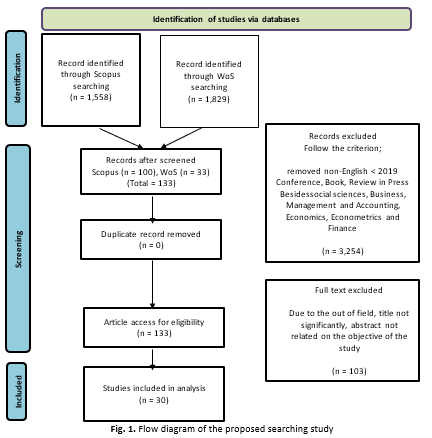A Comprehensive Review of Information Technology in Enterprise Risk Management at Higher Education Institutions
DOI:
https://doi.org/10.37934/araset.61.2.161178Keywords:
Enterprise risk management, Information technology, Higher educationAbstract
Enterprise risk management (ERM) is a comprehensive framework that effectively manages and mitigates risks across various industries, ensuring efficient risk management and mitigation strategies. This study aims to examine the existing literature and find common patterns and approaches to determine the most effective strategies for enhancing information technology (IT) in ERM at higher education institutions (HEIs). The methodology utilized in this investigation involved the Preferred Reporting Items for Systematic Reviews and Meta-Analyses (PRISMA), which encompassed a rigorous approach to gathering and examining data. The research utilized a series of sophisticated search methodologies, notably focusing on the keywords; “information technolog*” OR “digital technolog*” OR “computerized technolog*” OR technolog* AND “risk management” OR “enterprise risk management” OR “integrated risk management” OR “corporate risk management” AND “higher education*” OR education OR universit* OR college*. The search phrases were utilized in the SCOPUS and Web of Science (WoS) databases to attain an extensive and all-encompassing compilation of pertinent scholarly works. The investigation encompassed the period from 2019 to 2023, leading to a comprehensive examination of the extant literature on the subject matter. The study implemented specified inclusion and exclusion criteria to ascertain pertinent research, leading to a final sample size of articles (n = 30). The final analysis report thoroughly examines the results obtained, highlighting the rigorous verification of the data by experts in the field. The data underwent a thematic analysis methodology to categorize and consolidate it. The study yielded the successful identification of three distinct themes, specifically (1) digitalization in educational management, (2) strategies and approaches, and (3) impacts and changes. These themes provide a complete understanding of the intricate landscape that forms the focus of our study. This detailed analysis underscores the importance of IT in ERM at HEIs, digitalization, strategies, and impacts. The benefits include improved strategic decision-making, effective allocation of resources, and a strong foundation for managing risks. There is a growing imperative for the cultivation of aptitudes and the dissemination of information.




























